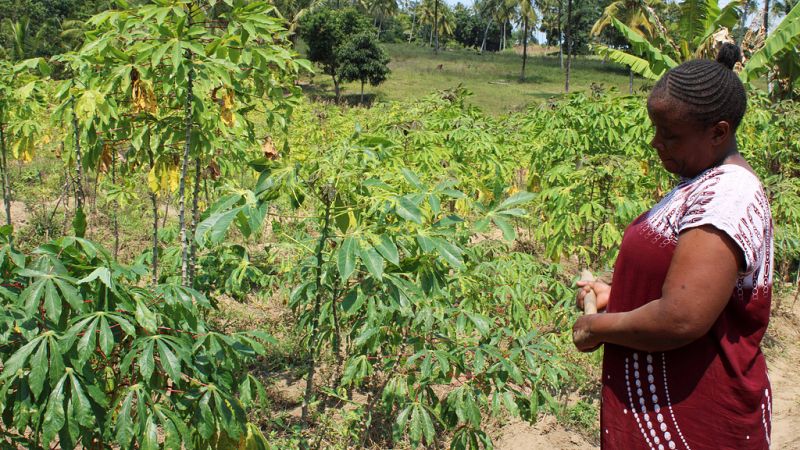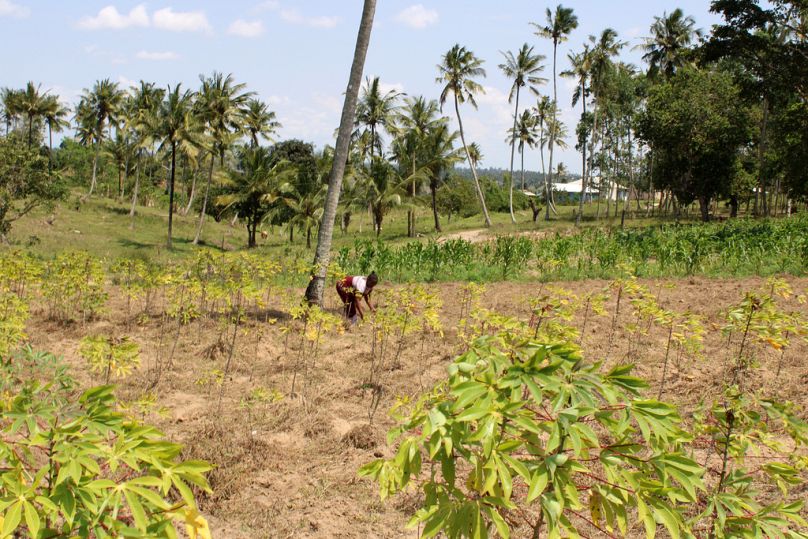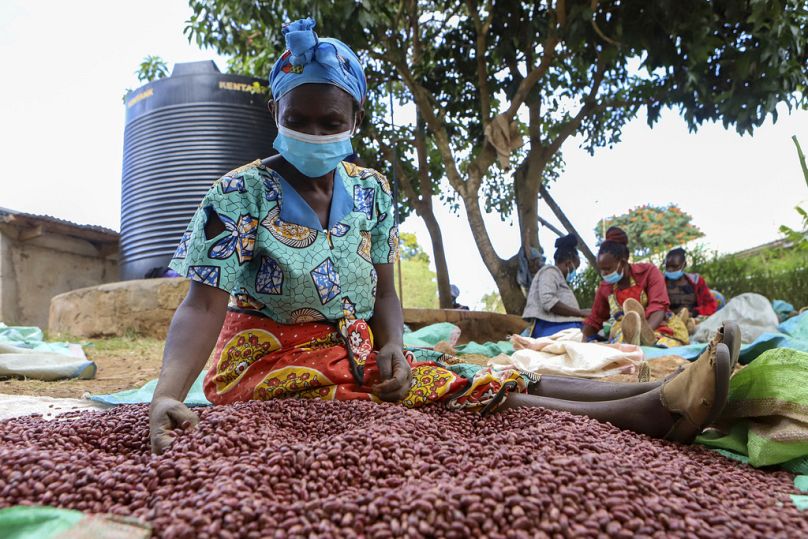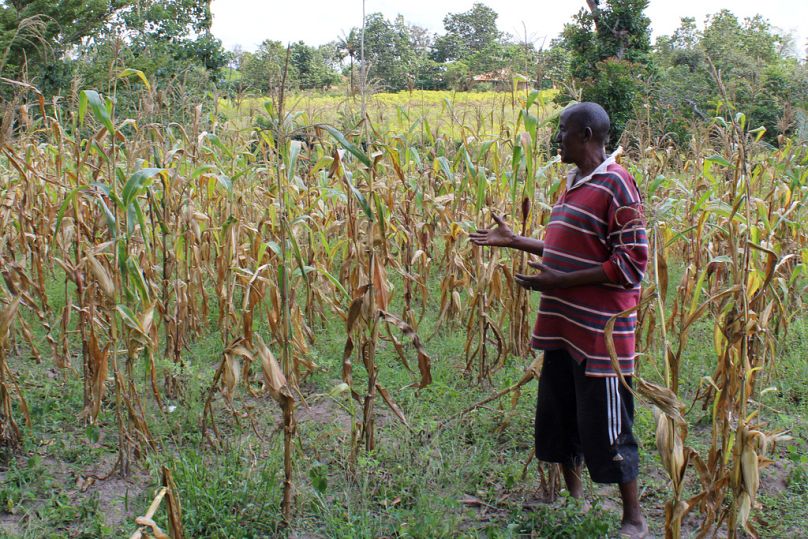Kenya project looks at impact of climate change on women's mental health

Ahead of World Mental Health Day, a project in rural Kenya has been studying the possible effects of climate change on mental health. A survey of nearly 15,000 women produced concerning signs, with results suggesting droughts and heat waves are linked with much higher levels of suicidal thoughts.
In Kaloleni, Kilifi County, Elizabeth Amina Kadenge briskly walks to her three acre plot under the scorching mid-morning sun.
For decades, the 41-year-old mother of three has tilled this land and it has been her family's main source of food.
However, the harvests have become unpredictable in the recent years.
In the last season, heavy rainfall dashed her hopes for a bumper harvest, plunging her into uncertainty about where the food is going to come from.
“It has been very stressful because farming is also my business. When I farm the way I know, some of my maize is for food, and some of it is for my business. But if it fails, I have no food and no business,” she explains.
To address the anxiety brought about by unreliable weather, Kadenge has switched out maize for cassava, which is less fickle.
"While the loss of maize is already a setback, my bigger concern is the lack of subsistence food. Maize takes about three months to mature and be ready for harvest. In contrast, cassava planted today won’t be harvested until around this time next year. This means that during this entire period, I will have to spend money to buy food — something I wouldn’t need to do if my maize yield had been successful. It’s a serious challenge," she says.
Kaloleni is one of Kenya’s poorest areas: women carry buckets of water home for miles through the dusty landscape; homes are mostly built of mud and have no plumbing or indoor toilets; maize plants wither in the dry heat.
Climate change has exacerbated the situation.
Climate anxiety
Although remote, Kaloleni is also one of Kenya’s most studied populations.
A network of community health workers visit all the households here every month to check how people are doing.
They’re also filling in questionnaires, which the government then uses to understand needs in rural communities.
Jasmit Shah is a data scientist at the Aga Khan University’s Brain and Mind Institute who wanted to research the impact of climate change on the mental health of women in Kenya’s rural farming communities.
While climate anxiety has been studied in the United States and Europe, no study on mental health had been done with women in this region before: there was no baseline.
The university had already been supporting Kenya’s government in its data collection in Kilifi County.
To do their own research on mental health and climate change, all they had to do was add some of their own questions.
The challenge was making sure that nothing would get lost in translation.
"We had to translate our questionnaires that we had in English to Swahili and then back translate to make sure the meaning was there and also because these are standardized questionnaires that are used globally so even when they are used in the local language, you have to make sure you haven't changed the meaning or the context of the questionnaire. That is because of making sure that there is validity, " Shah explains.
The questions included whether the women had ever considered suicide.
"Suicidal thoughts yes, there were some women who never answered those questions but you know, the analysis that we did was on people that answered those questions and it is a problem. We have to talk to them, ask them and engage them but it was purely a quantitative question that we would ask. 'So do you have any suicidal thoughts or ideation and if you do, do you have it every day, several times a week, do have a few times a month?' So it is because of that standard questionnaire. But then we don't ask them more onto that about how they did it, why they did it, what made them do that. So those are not somethings that are asked. So yes when you do a qualitative those are questions that you could probably ask the participants," he adds.
Shah says the survey of nearly 15,000 women produced some concerning signs.
For example, he says, it appears that droughts and heat waves are linked with much higher levels of suicidal thoughts among the women.
Humphrey Kitsao is a Community Health Promoter who looks after 115 households in Kilifi county, totaling 532 people.
He’s been doing this work for 18 years and says he’s seen a lot of change.
“People here still farm, but their income isn’t like before. They have to spend a lot of money on their farms, but often there is no harvest. So in terms of income, they’re not getting good returns,” he says.
Multiple dimensions
Zul Merali, director of the Brain and Mind Institute at the Aga Khan University in Nairobi, says there are multiple dimensions to climate change.
"So one is the ability to grow your crops which tend to fail more when you have a drought for example. But on top of it, it has implications on the price of food so here are poor communities now not able to grow their crops and having to spend much more on the food. It creates a lot of pressure on the communities particularly on women because they are in charge of making sure that the kids and families are fed and so it creates an extra level of stress," he explains.
According to Merali, it is imperative that both agricultural and mental health approaches are put into use in order to help the rural communities that are most affected by climate change.
"If you want resilient communities, you can't not be thinking about mental well-being as well. So I think that that's a very important component of building resilience communities. And it is very clear that in these communities, the climate change impact is not going to be a short term thing. It's going to be lasting for years to come. Those are the projections. So I think there should be more infrastructure to provide mental health support in those communities as well as trying to figure out ways of dealing with those shortages that they will experience for example in water supply and things like that," he says.
Mercy Githara is the mental health and psychosocial manager at the Kenya Red Cross, and in her experience, the mental fallout from droughts or floods is very real, whether communities talk about it or not.
She notes that there is a lot of psychological distress among these communities, with mental health conditions such as depression and post-traumatic stress disorder on the rise.
She wants to see a greater emphasis on mental health.
"Globally as well as in the country, we have very few resources that are dedicated for mental health and also mental health is usually sidelined until when symptoms and issues like the illnesses are rising. When we speak about issues of people dying by suicide is when people remember the effects of this. So it's to advocate for integration of mental health into climate smart solutions that are being developed and innovative and even policies that are being developed that as we look at the changing global patterns and weather patterns, we are able to think about mental health," she says.
Shah and the team involved are hopeful that it’s already starting to happen and applaud efforts by the Kenyan government in initiating the Community Health Promoters (CHP) programme across the whole country.
The CHPs go through mental health training with the Ministry of Health thus enabling them to tackle mental health problems at household or individual levels.
They then refer them to a facility where a qualified health professional professional can attend to them.
World Mental Health Day - an international day for global mental health education, awareness and advocacy - falls on 10 October.
Today




